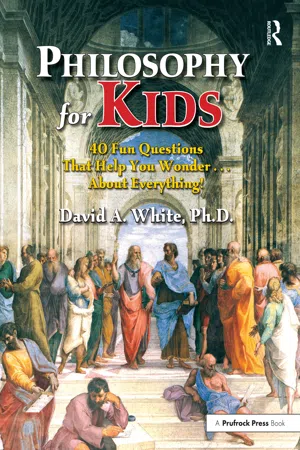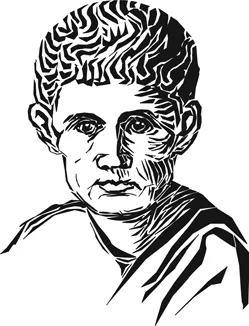
Philosophy for Kids
40 Fun Questions That Help You Wonder About Everything!
- 216 pages
- English
- ePUB (mobile friendly)
- Available on iOS & Android
About This Book
Inspire animated discussions of questions that concern kids—and all of us—with this innovative, interactive book. Open your students' minds to the wonders of philosophy.Allow them to grapple with the questions philosophers have discussed since the ancient Greeks. Questions include: "Who are your friends?, " "Can computers think?, " "Can something logical not make sense?, " and "Can you think about nothing?" Young minds will find these questions to be both entertaining and informative. If you have ever wondered about questions like these, you are well on your way to becoming a philosopher! Philosophy for Kids offers young people the opportunity to become acquainted with the wonders of philosophy. Packed with exciting activities arranged around the topics of values, knowledge, reality, and critical thinking, this book can be used individually or by the whole class. Each activity allows kids to increase their understanding of philosophical concepts and issues and enjoy themselves at the same time.In addition to learning about a challenging subject, students philosophizing in a classroom setting, as well as the casual reader of Philosophy for Kids, will sharpen their ability to think critically about these and similar questions. Experiencing the enjoyment of philosophical thought enhances a young person's appreciation for the importance of reasoning throughout the traditional curriculum of subjects.The book includes activities, teaching tips, a glossary of terms, and suggestions for further reading.Grades 4-12
Frequently asked questions
Information
PART I
Values
Question #1—Plato
Are you a fair and just person?

- “Please give it back to me.”
- “Why?
- “Because you borrowed it and it’s mine.”
- Read the four alternatives below, think about the situation, then write the letter representing your answer in the space provided:
- Try to convince your friend that you still need it.
- Keep it as long as you can; after all, you need a calculator.
- Return it—the calculator is your friend’s, not yours.
- You can always make another friend; keep the calculator.
Write your answer here: ________
- II. Here are four alternatives. Place the letter for your answer in the space provided below:
- E. Keep the weapon; the friend is unstable, and what the friend will do with the weapon once it is returned is unknown.
- F. Return the weapon; after all, it’s the friend’s property.
- G. Talk to a philosopher and ask for the true definition of justice. Once you know this definition, then you will know what should be done.
- H. Try to get professional help for the friend.
Answer here: _______
- Answer (H) suggests that the friend is important. Although this attitude is good, it does not really help answer the question about the just thing to do in this instance. (Are you sure you know what it means to be a friend? See Question #2.)
- Answer (F) shows that you understand the original definition of justice and that you want to apply that definition. But, would it truly be just to return a weapon to someone if that individual were insane?
- Answer (E) eliminates the harmful consequences that might occur if an insane person had a weapon. However, to keep the weapon when it belongs to another person violates our definition of justice. Can a person act unjustly in order to do something good? Somehow this does not sound correct.
For Further Thought
- Should you be just to your enemies as well as to your friends?
- Can you be unjust to yourself?
- If the answer to 2 is yes, then can you also be just to yourself?
Question #2—Aristotle
How do you know who your friends are?

- “She’s a friend of mine.”
- “Oh, he’s my best friend!”
- “You’re not my friend anymore!”
- If John and Jim help each other with homework on a regula...
Table of contents
- Cover
- Half Title
- Title Page
- Copyright Page
- Dedication
- Table of Contents
- Preface
- Acknowledgments
- Introduction
- Part I—Values
- Part II—Knowledge
- Part III—Reality
- Part IV—Critical Thinking
- How to Philosophize if You Are Not a Philosopher
- Additional Reading in Philosophy
- Glossary
- Index
- About the Author